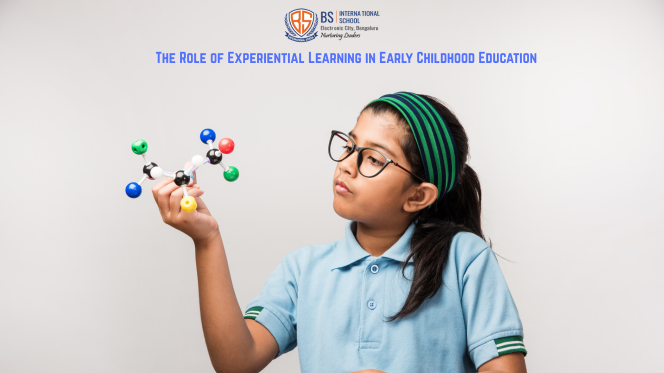
In the early years of a child’s development, the way they learn has a profound and lasting impact on their outlook towards education and life itself. At BS International School, we strongly believe that children thrive when they learn by doing an approach known as experiential learning.
Experiential learning enables children to pursue their areas of interest and to work through challenges as they arise in real-life situations. Rather than memorizing formulas or facts for the sake of exams, they engage in meaningful exploration. For instance, instead of being told what 2 + 2 equals because it’s part of a curriculum, children might figure out the sum by counting how many toys they have, how many biscuits the dog eats, or how many shoes need to be picked up. This contextual, hands-on approach helps children understand the practical uses of math, science, and language in their everyday lives.
One of the key advantages of experiential learning is that it builds relevance. A common complaint among primary and high school students is that they don’t see the point of the work they’re doing. But when learning is embedded in real-world tasks and challenges, the “why” becomes clear. Children become naturally curious, more engaged, and more motivated to solve problems because they can see the immediate outcomes of their actions.
all with the gentle guidance of teachers. Rather than following a fixed path to the “right” answer, they discover that there can be multiple ways to solve a problem. This cultivates flexible thinking and helps them understand that the world isn’t always black and white.
Another important lesson experiential learning teaches is resilience. In the process of discovery, children inevitably encounter setbacks. But these moments are just as valuable as success. Experiential learning allows children to experience the reality of failure — not as something to fear, but as an opportunity to learn, adjust, and try again. The pride they feel when they finally succeed is deeper and more lasting because they found the solution themselves, not because someone handed it to them.
We also believe that learning goes far beyond academic skills. Life skills such as cooperation, communication, time management, and empathy are naturally developed through group projects, outdoor activities, and role-playing games. Whether it’s learning to share during playtime or organizing their art materials independently, these experiences shape their character and prepare them for a lifetime of learning.
Interestingly, experiential learning is not a one-way street. At BS International School, we recognize that children teach us too. Their unfiltered questions, their creativity, and their fresh perspectives often reveal insights that adults might overlook. Children are still discovering how the world works and defining their place within it. Sometimes, the most profound observations come from these little explorers simply because they are not yet limited by what “should be.”
In a world that’s constantly changing, we must equip our children not just with knowledge, but with the ability to think, adapt, and grow. Experiential learning forms the foundation of this mindset — one that BS International School proudly nurtures every day in our classrooms, playgrounds, and learning spaces.
Let children do, explore, fail, and succeed. Let them experience learning.
